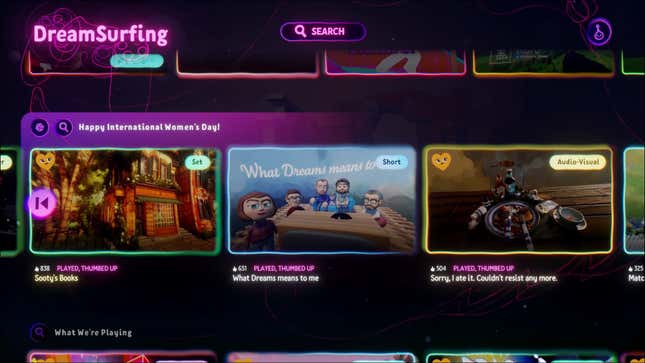
More than a year out from release, Dreams stands apart for its unique combination of game creator and sharing platform. But one aspect that has attracted much criticism over the past year is its curation. For the longest time, memes and unfinished “Dreams” buried the best of what the platform had to offer, giving the impression that there wasn’t much worth playing. It’s a reputation that’s been difficult to shake. But since late 2020, Media Molecule has started investing heavily to address this, building out a team to try and make finding quality creations a far smoother experience.
Dreams is Media Molecule’s creation engine/game available for the PlayStation 4 and 5. It allows players to create music, art, and video games using a wide variety of tools, which players can upload to the game’s social hub called the Dreamiverse.
There have been many incredible creations published to the platform so far—everything from episodic PS1-style RPGs like “Tales from the Dark Town” to spherical shooters like “Retica.” But many in the community believed Media Molecule could be doing more to put these creations in front of players.
When the game launched in early access in 2019, Dreams only featured a single row of creations that players could scroll through, making it difficult to separate the good from the bad. Over time, this evolved into multiple categories, with only a couple of these sections being manually curated, such as “MM Picks” and “What We’re Playing.” The studio used categories to highlight creations worth playing and pieces featured on Media Molecule’s weekly livestreams. But it still wasn’t the most intuitive approach to connect players with the best the game had to offer.
Kotaku spoke with Media Molecule’s studio director Siobhan Reddy and Dreams’ live product lead Abbie Heppe on the studio’s recent efforts to improve curation across the board.
“One of the big things we did in the last half of last year was we made Abbie the live product lead for Dreams,” says Reddy. “That’s been a really big step because the live [aspect] is its own product in a way…We’re on a big recruitment drive right now because to make the progress we want, we need programmers, and we need designers. What really excites me about all of this is Sony is really behind what we’re doing and are investing in the studio to grow.”
The studio has hired several curators and editorial staff who highlight the best Dreams. Over the last few months, the team has introduced several new categories, including curated lists for racing games, escape rooms, visual art projects, and arcade games. It’s now far easier to find the type of creations you want to play or stumble across something interesting. It’s a nice change from having to rely on word of mouth.
“It’s one of those things where I wish that we started it earlier, but Dreams is a learning process,” says Heppe. “Since December, we’ve been making a really big push to make the front page of Dreams really connect people to the content they’re going to want to play and to surface the best stuff. There’s really no shortage of great things.”
Much of this curation work so far has involved keeping a close eye on the creator community to make sure they don’t miss an opportunity to highlight something interesting. But it’s also about finding natural ways of resurfacing old creations to coincide with annual or seasonal events. A good example is the recent overhaul for the Impy Awards, Media Molecule’s annual award show for Dreams. To coincide with this year’s event, the studio highlighted a number of the featured creators on the front page. Media Molecule did the same this month for International Women’s Day, letting players rediscover the best Dreams created by women. This included the first-person visual novel “The Widow,” which was made for Halloween and the challenging yet rewarding platformer “Beat Runner.”

“People spend a lot of time making these games and making these really awesome creations,” says Heppe. “And like being able to rotate them in or out or say, ‘This week we’re featuring these topics’ and then being able to bring back games that were published a year ago or a month ago is really important. There’s a certain one and doneness to [the curation] that we definitely don’t want.”
The inspiration for many of these changes came from streaming platforms. Reddy cited Netflix, Apple TV, and Amazon Prime as inspirations.
“The thing that I’ve watched the team [try] to hone is being that content platform, and actually learning all the tricks of the trade and how long should [playlists and banners] be up there and how do you bring people back. And it’s really fascinating because there’s a real art to it,” Reddy adds.
Both Heppe and Reddy suggest more changes are coming, but this investment in curation already seems to be paying off. According to Heppe, engagement is up, with existing players and creators dedicating more time to playing and engaging with Dreams. The studio has also started extending this effort to potential players outside of the game’s community, hiring former Edge editor Jen Simpkins to oversee more editorial content and weekly roundups for the website. The biggest problem with Dreams has always been its poor messaging about what it actually is and what it has to offer players. Informing people who are unsure about the game on what they can expect could convince some potential players.

“I share lots of things in Dreams with my parents who love music videos and the different things people make,” Heppe says. “[But] how do you get that person to maybe enjoy that in the Dreams platform?”
Although curation was one of the biggest issues that community members raised, another feature that remains a hot topic is the ability to export and monetize Dreams to reach a wider audience outside of the platform. At the moment, it is only possible to export and monetize video, audio, and imagery from Dreams rather than a full creation. Media Molecule co-founder and art director Kareem Ettouney, however, told GamesIndustry.Biz that the studio intends to allow creators to publish their games outside of the Sony ecosystem and “to other devices and beyond.”
When asked about this, Reddy said the feature was still a work in progress.
“It’s complicated, and we have to do it in the right way, and we have to do it in a way that works with Sony because we’re a big organization,” she adds. “So, I think for ages we’ve been saying to the community, ‘We’re working on it,’ and we’re still at that point.”
Even with exporting shelved for the moment, Media Molecule still plans to bring more to Dreams.
“Right now, we’ve been focused on players and communication,” says Heppe. “But as we’re starting to plan what the next few months look like, it’s bringing some more of that customization of the playlists and really connecting players with the content they want to see. We already noticed that after investing in curation that some of our players started engaging more. That was a really good sign. And I think that was a step in the right direction. But like I said, it’s a journey.”




